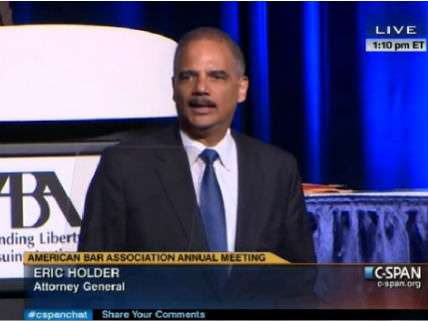'Our Federal Prison Population Is Not Exploding'
And other lousy arguments against sentencing reform.

Despite bipartisan support for serious sentencing reform, some members of Congress portray any proposals to reduce current penalties as dangerously soft on crime. In my latest Forbes column, I explain why they're wrong:
Between 1980 and 2013, the federal prison population exploded, rising from 24,640 to 219,298, largely because of the war on drugs, which accounts for half of federal prisoners. Yet the National Association of Assistant U.S. Attorneys (NAAUSA) insists in a recent position paper that "our federal prison population is not exploding." How so? The number of federal prisoners fell slightly between 2013 and 2014, from 219,298 to 214,149. According to NAAUSA, that 2.3 percent drop makes up for the 790 percent increase that preceded it. Since balance already has been restored to the criminal justice system, it says, there is no need for sentencing reform.
The desperation reflected in such transparently misleading arguments is a hopeful sign for those of us who agree with former Attorney General Eric Holder that "too many Americans go to too many prisons for far too long, and for no truly good law enforcement reason." Bipartisan support for sentencing reform is stronger than at any point in recent memory, with the Obama administration and leading Republicans in both chambers of Congress united in viewing current penalties as excessively harsh. "I've long believed that there needs to be reform of the criminal justice system," House Speaker John Boehner (R-Ohio) said last month. "We've got a lot of people in prison, frankly, who, in my view, really don't need to be there."
Most Americans seem to agree. In an ACLU survey conducted last June, more than two-thirds of respondents said it is important to reduce the number of people behind bars, which includes about 2 million people in state prisons and county jails in addition to the 200,000 or so in federal prisons. The only thing preventing legislators from acting on that goal is bad arguments and the fear they inspire.
Editor's Note: As of February 29, 2024, commenting privileges on reason.com posts are limited to Reason Plus subscribers. Past commenters are grandfathered in for a temporary period. Subscribe here to preserve your ability to comment. Your Reason Plus subscription also gives you an ad-free version of reason.com, along with full access to the digital edition and archives of Reason magazine. We request that comments be civil and on-topic. We do not moderate or assume any responsibility for comments, which are owned by the readers who post them. Comments do not represent the views of reason.com or Reason Foundation. We reserve the right to delete any comment and ban commenters for any reason at any time. Comments may only be edited within 5 minutes of posting. Report abuses.
Please to post comments


If your enforcer class would just fatally escalate more encounters then you wouldn't have to house so many mammals. Although my bosses appreciate the cattle pens your species has already erected.
And neither the government or the debt is exploding - now.
It has already exploded over the last decade or more and is hitting hard limits on expansion.
Perhaps more privatized prisons (might solve what to do with illegal immigration?) would solve the prison population problem. But I think such would be monstrous.
Eliminate "victim-less crimes" and ONLY incarcerate humans who HURT other humans by physical violence or stealing their possessions.
Make prisoners work to earn any extra privileges beyond food, a bed, etc.